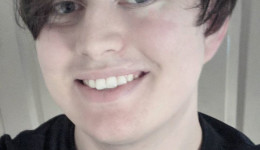Ryan F




Instruments: Guitar, Bass Guitar, Music, Electric Guitar, Classical Guitar, Acoustic Guitar
Styles: Classical, Jazz, Pop, Rock, R&B, Musical Theater, Funk, Hip Hop, Electronic, Showtunes, New Age, Bossa Nova, Soul, Punk, Avant-garde


Ryan F



Instruments: Guitar, Bass Guitar, Music, Electric Guitar, Classical Guitar, Acoustic Guitar
Styles:
Classical, Jazz, Pop, Rock, R&B, Musical Theater, Funk, Hip Hop, Electronic, Showtunes, New Age, Bossa Nova, Soul, Punk, Avant-garde
Where I Teach:
Ages Taught: 10-80
2016 - E. Mulling Outstanding Music Student Scholarship
2018, 2019 - Artist at Oregon Fringe Festival
Hi, I'm Ryan! From day to day, I do everything from composing, to teaching students, to building electronic instruments at my studio in Southern Oregon. I specialize in extended-range guitars, as well as producing music for soundtracks. Throughout the years I've had the pleasure of writing and performing classical, jazz, rock, funk, metal, R&B, hip-hop, and many things in between. My academic background lies in the intersection of mathematics and music - I have given talks on music cognition, the physics of sound, and methods of overtone-based analysis at events like the Southern Oregon Arts and Research Conference and the Ronald E. McNair Scholars Research Symposium. In addition to regularly writing commissioned original compositions and conducting research into the cutting edge of audio, I am currently exploring new ways to create generative art and sound, most recently in now.then.never (2019) and Lovely, Sweet Dreams (2018), two audiovisual projects I created and premiered in collaboration with the Oregon Fringe Festival.
I have been a professional guitarist, composer, and instructor for the better part of a decade, and have years of extensive experience in performance, production, composition, and music theory. Over the years, I've written, recorded and performed on hundreds of songs for video game soundtracks, and have released personal projects in countless styles. I began teaching students around the time I was in high school, when I helped start up an after-school music pilot program to teach basic theory, guitar and piano to a students from a wide range of backgrounds and experience. As a composer, my music has been featured in interactive media projects around the world. These experiences have helped me develop a flexible range of skills and allowed me to see a beautiful cross-section of the vast world of music. As always, though, I'm still learning more every day, finding new ways to think about music, and trying to develop those ideas into teachable moments.
There is no one-size-fits-all way to learn music, and my methods are constructed with this in mind. At the fundamental level, I begin by focusing on ear training and the subtle human elements of music - dynamics, tone, and expression - so that my students have a solid framework. Listening to music on a visceral level and understanding what makes a musical performance interesting is critical for developing as an artist. For guitarists, for example, once they develop a solid connection with the basic methods of producing sounds on their instrument, the possibilities branch out enormously. I will approach much different theoretical topics with a student who wants to learn to play classical guitar etudes than one who wants to play modern, jazz and rock-influenced music, or someone who simply wants to learn to play country songs they like by ear. I create custom lesson plans that are tailored to my student's individual needs - I understand that no two musicians have exactly the same areas of interest, and so the first step is always determining what it is that my student wants to learn. I always try to incorporate my students' personal favorites into the repertoire they learn, and find ways to teach new concepts and techniques with music they already know and love, which I know from experience is the best way to make substantial progress as a musician.
My primary goals as an instructor are for my students to: 1. Develop an intuitive understanding of music that works for them 2. Find their unique musical voice/niche as an artist 3. Foster a desire to share music and knowledge with others The path to get there varies widely based on a student's experience, areas of interest, and focus! Everyone learns and improves at their own pace, particularly when it comes to something as personal as music - for this reason I set goals at the individual level, so that my students are not put in the position of measuring their unique progress with a rigid, arbitrary benchmark. I always strive to keep my teaching style flexible and receptive to feedback on what works and doesn't for individual students.

